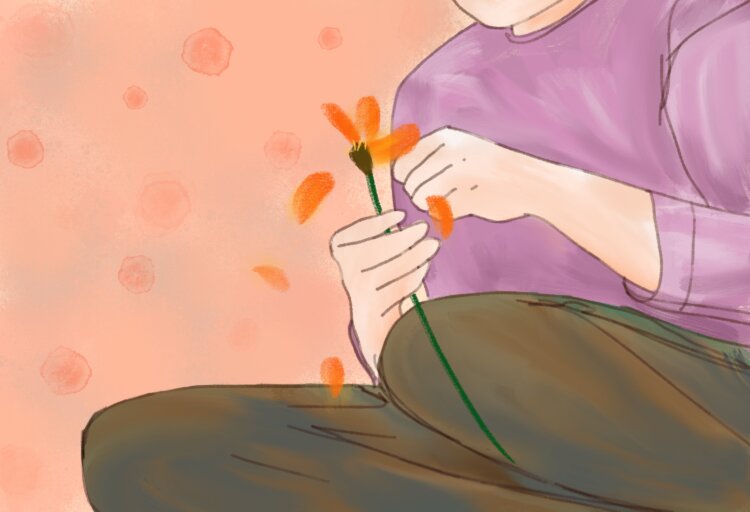
“It’s called premature ovarian failure,” my OB-GYN said slowly, with an air of boredom, glancing down at the LH and FSH hormone levels. My primary care physician had ordered the tests after my yearly physical, when I’d mentioned feeling a bit “off” just shy of my 40th birthday. That they would come back post-menopausal had never occurred to me.
“So does this mean I may never get my period again?” I asked. After years of a steadfast 28 day cycle, I’d missed the past two months.
“It’s very possible,” she said.
I was surprised by my reaction: tears, mingled with a strange sense of shame that I tried to quell in front of her. I knew by now that I wasn’t going to have any more children. I’d had my daughter at 32, and my husband had passed away suddenly less than two years later just before we were about to try for a second child. Six years after he died, I was still single. I’d been blindsided by his death. The first in my circle of friends to call herself a “widow,” prematurely. They were still changing diapers, still closing on homes, still announcing third and fourth pregnancies. I had closed out bank accounts, bought my own cemetery plot next to his, and grieved the love of my life. Though I had their compassion and support, they couldn’t come with me—there was no camaraderie.
Now here I was again, blindsided and with no comrades in sight. My friends were still complaining about cramps and PMS and I was starting to deal with heart palpitations, anxiety, and hot flashes. They were emerging from the young parenting years starting to take better care of themselves, work out, and feel pretty again. My body now looked more like my mother’s. My narrow waist, always one of my favorite features, was filling out, my brain—foggy, my hair—falling out.
One thing I’d guarded myself against during my early grief process when my husband died were the words, “This isn’t fair.” They felt cheap, and I knew that a lot of people went through very difficult things in life. But leaving the gynecologist’s office, after she’d said nothing more than, “Just embrace it,” they were all I could think of. “This feels unfair…I feel cheated of about 10 years of my life. Just when I was finally starting to get it together…this.”
I wasn’t comfortable “embracing it.” I spent a few of my anxious, insomniac nights researching online and trying to see if there was another reason for my hormonal shift. I made an appointment for a pelvic ultrasound. No issues there- just a couple of fibroids. I saw an endocrinologist who ordered vials and vials of blood to be taken and tested. I sucked on a soggy spoon at midnight so she could measure the cortisol levels in my saliva. Nothing came back amiss. And the doctor, a woman about my age, with a sweet lilting voice and a warm bedside manner, sat close to me and told me that to be officially in menopause I’d have to miss my period for 12 consecutive months. She told me I’d just have to wait.
RELATED: Why I miss my period
It starts with waiting. My 10-year-old daughter now is nearing that stage. There’s been time to prepare though. We have already read the book that describes the changing adolescent body.
This year in fifth grade she’ll get the presentation from the school nurse. Then starts the waiting, hearing about other friends who “got it,” and wondering when it will happen for you.
The waiting is there when you’re trying to conceive again. This time each month you’re hoping it won’t arrive. If it does, the waiting begins again. Another two weeks to wait until ovulation. Another two weeks after that to see if you bleed. And on and on. There are the books again that you can read. You can diligently take your prenatal vitamins like I did months before. At the end of the wait, there is the quiet celebration of the period that never came, and then the louder one—announcing to the world that you are bearing new life. Then there is the busy work of nesting and preparing as your body gives you a fairly reliable time frame of nine months. More waiting…but still, rather reliable.
There aren’t many books to help you wait out that last time though. No one takes you out to lunch, and there are no congratulations. There is no real work of preparation that can be done. “You’ll just have to wait and see…” said the kind endocrinologist to me before I left.
There was a children’s book that made me teary when I worked in publishing about the last time you hold your child. It highlighted the fact that we’re really good at celebrating firsts, and usually completely unaware of the “lasts.” They often pass by unnoticed, just the way all of my lasts with my husband had—the last dinner together, the last hug or kiss, the last night in the same bed.
It turned out that I hadn’t had my last period. My period seemed to sputter along and come and go, sometimes for a few months at a time. Just like when I’d just bought a ton of sleep-training diapers when my daughter was potty training, and so of course she never peed in her bed again, it seemed now that as soon as I bought a new stock of tampons, my period would disappear again for a few months.
At 40, it seemed my body had betrayed me and decided I was done—done with romance, done with child-bearing, done with life. One and a half years later, I’ve come to accept, but not embrace, the waiting. I’ve created my own rituals where there were none—going to Sephora to have a mini makeover- smoky eyes seemed appropriate. Buying a deep shade of lipstick I call my “mid-life” red in a glamorous gold case like those of the 1940s has helped. Watching my favorite old 1980’s sitcoms and listening to the 80’s station in the car a lot brings me joy.
And what I’ve discovered about myself is that I’m not done with life at all. In the past year and a half I’ve taken long walks, gone to yoga, gone to sleep earlier. I’ve seen a holistic nutritionist and tried a gluten-free diet. I’ve gotten acupuncture every week for five months in an attempt to bring more balance to my body. I joined different Facebook groups with names like “Thriving in Perimenopause” and “Radiant KissAss Women’s Club.” I ordered cookbooks for hormonal balance and tried a “seed rotation.” I bought free weights to keep my bones strong, and made an appointment with a cardiologist to see how I could protect my heart better.
“Waiting is an invitation to intimacy,” writes Jerome Daley, and I’m thankful for every month that still has this element of waiting to it. I think in every stage of life, whether it’s the stage of my 10-year-old daughter, or the young woman longing for a positive sign on the pregnancy test, or even the woman in her forties or fifties wondering if this is the last time, there is that invitation to intimacy. In the waiting, we come to know ourselves more deeply: who we really are, what we hope for, and who we’ll become. I may be braving this path a few years ahead of friends once again, but in this place of waiting and intimacy, the camaraderie I’ve discovered—is with myself.


Grok Nation Comment Policy
We welcome thoughtful, grokky comments—keep your negativity and spam to yourself. Please read our Comment Policy before commenting.